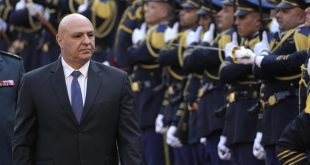لهذا السّبب… يتمسّك لبنان باللجان العسكرية
في خطوة تبرز ملامح الانقسام بين لبنان الرسمي والضغوط الأميركية، تواصل الحكومة اللبنانية رفض تشكيل 3 لجان تضم عسكريين ومدنيين دبلوماسيين للتفاوض مع إسرائيل. هذه اللجان كانت قد اقترحتها المبعوثة الأميركية مورغان أورتاغوس، في محاولة لحسم النزاع حول النقاط الحدودية المتنازع عليها، ولإتمام ملف الأسرى اللبنانيين الذين تحتجزهم إسرائيل.
لبنان يرفض مشاركة الدبلوماسيين في اللجان
من المقرر أن تبلغ الحكومة اللبنانية، ممثلة في الرؤساء: الجمهورية جوزيف عون، المجلس النيابي نبيه بري، والحكومة نواف سلام، المبعوثة الأميركية بموقفها الرافض لضم الدبلوماسيين إلى اللجان العسكرية المقترحة. يرى لبنان أن هذا الاقتراح يشكل استدراجاً لمفاوضات سياسية حول تطبيع العلاقات مع إسرائيل في مرحلة لاحقة، وهو ما يتناقض مع السياسة اللبنانية الثابتة التي ترفض أي تطبيع مع إسرائيل قبل أن تقوم الدول العربية بذلك أولاً.
وقد أكد لبنان مراراً على أهمية تشكيل اللجان العسكرية المختصة فقط، والتي كانت هي الوسيلة التقليدية لمعالجة القضايا العالقة بين لبنان وإسرائيل. هذا الموقف يأتي رغم الضغوط الأميركية المتزايدة التي تسعى إلى دفع لبنان للقبول بالاقتراح الأميركي.
الواقع على الأرض: الانسحاب الإسرائيلي والتحديات المتبقية
بالرغم من اتفاق وقف إطلاق النار الذي جرى توقيعه في نوفمبر الماضي، لا تزال إسرائيل تحتفظ بخمسة مرتفعات استراتيجية على الحدود اللبنانية. هذه المرتفعات تمكنها من فرض رقابة على مساحات واسعة من الأراضي اللبنانية على جانبي الحدود. وعلى الرغم من الانسحاب الإسرائيلي من مناطق أخرى في جنوب لبنان، فإن تل أبيب واصلت شن غارات على الجنوب اللبناني مستهدفة ما تصفه بأنها مواقع عسكرية لحزب الله.
وكانت لجنة مراقبة وقف الأعمال العدائية التي يرأسها الجنرال الأميركي جاسبر جيفرز تعمل على متابعة تنفيذ الاتفاقات. إلا أن هناك أنباء عن تجميد عمل اللجنة وسط الضغوط الأميركية المتزايدة على لبنان للموافقة على اللجان الثلاث. ورغم هذه الضغوط، يبقى الموقف اللبناني ثابتًا بأن اللجان العسكرية الحالية كافية لتسوية النزاعات المتبقية، ومنها ترسيم الحدود البرية، وتسوية ملف الأسرى، بالإضافة إلى متابعة تطبيق القرار 1701.
موقف لبنان من خطة التطبيع الأميركي
في ظل هذه التحديات، يبقى الموقف اللبناني الرسمي ثابتا، حيث ترفض الحكومة اللبنانية أي محاولات للتطبيع مع إسرائيل قبل أن تقوم الدول العربية بذلك. السفير اللبناني السابق في واشنطن، رياض طبارة، أشار إلى أن هدف إسرائيل هو خلق منطقة عازلة وحماية المستوطنات في الشمال عبر تعزيز وجودها في النقاط الـ5 التي تحتلها. أما بالنسبة للولايات المتحدة، فهي ترى أن الظروف ملائمة للتوصل إلى اتفاق تطبيع بين لبنان وإسرائيل، وهو ما يرفضه لبنان بشكل قاطع.
وأشار طبارة إلى أن لبنان لن يكون الأول في التطبيع مع إسرائيل مهما كانت الضغوط الأميركية، مشدداً على أن لبنان يواصل تواصلًا مع الأميركيين لإقناعهم بعدم إمكانية أن يكون لبنان من بين الدول الأولى التي تطبع علاقاتها مع إسرائيل.
“For This Reason… Lebanon Sticks to Military Committees”
Lebanon's official stance, represented by President Michel Aoun, Speaker Nabih Berri, and Prime Minister Najib Mikati, continues to reject the proposal of forming three committees with military and civilian diplomats to negotiate with Israel. This proposal, put forth by U.S. envoy Morgan Ortagus, seeks to resolve issues related to the five disputed Israeli-occupied points, address the issue of Lebanese prisoners, and settle the fate of 13 contested border points between the two countries.
Lebanon Rejects the Inclusion of Diplomats in Committees
The Lebanese government is set to inform the U.S. envoy of its reluctance to include diplomats in the proposed committees. Lebanon’s objection stems from concerns that this could lead to political negotiations for future normalization of relations with Israel, something Lebanon has consistently opposed. Lebanon’s position remains firm that any normalization should occur only after the Arab countries have done so.
Lebanon argues that military committees, which have traditionally been used to resolve disputes with Israel, should be sufficient to address the remaining issues. Despite growing U.S. pressure, Lebanon stands by its position, seeking to avoid the political risks of normalizing relations with Israel prematurely.
On-the-Ground Reality: Israeli Withdrawal and Remaining Challenges
Although the November 2024 ceasefire agreement called for Israel’s withdrawal from areas it had occupied in southern Lebanon, Israel has retained control over five strategic hills, allowing it to monitor vast areas on both sides of the border. Despite the Israeli withdrawal from some areas, airstrikes continue on southern Lebanon, targeting what Israel claims are Hezbollah military positions.
The U.S.-led committee monitoring the ceasefire, headed by General Jasper Jeffers, is supposed to oversee the implementation of the agreements. However, there have been reports of a freeze in the committee’s activities amidst rising U.S. pressure on Lebanon to accept the proposed three committees. Despite these pressures, Lebanon continues to insist that the existing military committees are sufficient for resolving remaining disputes.
Lebanon's Position on the U.S. Normalization Plan
Given these challenges, Lebanon’s official stance remains unchanged: the country refuses to engage in normalization talks with Israel before the Arab world does. Former Lebanese Ambassador to Washington, Riyad Tabara, highlighted Israel's short-term goal of creating a buffer zone and ensuring the security of settlers in the north through its continued occupation of the five hills.
The U.S., however, believes the conditions are right for further steps toward normalization between Lebanon and Israel, which Lebanon rejects outright. Tabara emphasized that Lebanon remains committed to its stance and will not be among the first to normalize relations with Israel, despite ongoing U.S. pressure.
Translated by international scopes team
المصدر: بولا أسطيح – الشرق الأوسط
 International Scopes – سكوبات عالمية إجعل موقعنا خيارك ومصدرك الأنسب للأخبار المحلية والعربية والعالمية على أنواعها بالإضافة الى نشر مجموعة لا بأس بها من الوظائف الشاغرة في لبنان والشرق الأوسط والعالم
International Scopes – سكوبات عالمية إجعل موقعنا خيارك ومصدرك الأنسب للأخبار المحلية والعربية والعالمية على أنواعها بالإضافة الى نشر مجموعة لا بأس بها من الوظائف الشاغرة في لبنان والشرق الأوسط والعالم




